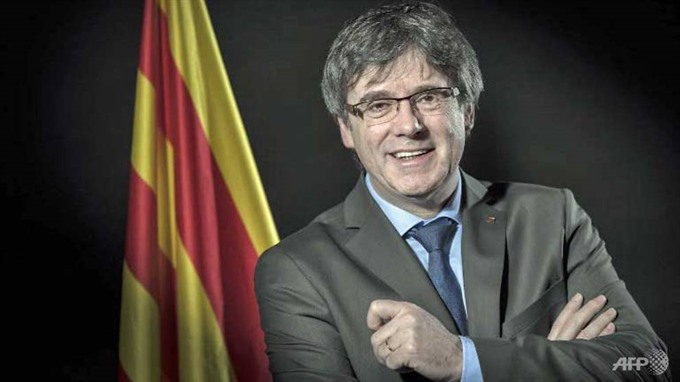 World
World

In self-exile in Belgium and wanted in Spain, Catalonia’s deposed leader Carles Puigdemont has abandoned his bid to return as regional president in an attempt to unblock the region’s political crisis.
 |
| File photo taken on Feb 07, 2018 of exiled former Catalan leader Carles Puigdemont in front of a Catalan flag during a photo session in Brussels. — AFP/VNA Photo |
BARCELONA — In self-exile in Belgium and wanted in Spain, Catalonia’s deposed leader Carles Puigdemont has abandoned his bid to return as regional president in an attempt to unblock the region’s political crisis.
"I will not put myself forward as candidate to be appointed regional president," Puigdemont on Thursday announced solemnly from Belgium in a video posted on social media, standing in front of Catalan and EU flags.
The 55-year-old called for a new candidate to be chosen "as soon as possible" from Catalonia’s separatist bloc, which won December elections in a region deeply divided over independence.
This could pave the way for Catalonia to get a fully-functioning government and regain its autonomy after Madrid took full control of the Spanish region over its October secession bid.
Madrid welcomed Puigdemont’s move, with a Spanish government source, saying Catalonia needed "to have a regional president as soon as possible".
Jailed leader?
Vowing to continue drawing the global community’s attention to Catalonia’a cause, as separatists accuse Madrid of repression in its crackdown, Puigdemont said his lawyers had taken the case to the United Nations Human Rights Committee.
He also put forward Jordi Sanchez, head of the ANC, a hugely influential pro-independence citizens’ group, as his preferred choice to lead Catalonia forward.
This is likely to be difficult, however, as Sanchez has been in prison for more than four months as he is probed for sedition, one of four separatists in jail over their role in the independence drive.
Sanchez stands accused of encouraging a major protest in September as Spanish police raided the Catalan administration’s economic offices in the run-up to a banned independence referendum on October 1.
Marred by police violence, Catalan authorities say turnout in the vote was around 43 percent, of which 90 percent backed independence, even if Madrid dismissed the referendum.
Weeks later, separatist lawmakers declared independence on October 27.
The Spanish government moved in immediately, stripping Catalonia of its prized autonomy, sacking its separatist government, dissolving its parliament and calling snap elections on December 21.
Puigdemont left for Belgium shortly after the independence declaration and was charged with rebellion, sedition and misuse of public funds.
But he still ran in the December polls from abroad, leading the separatist bloc to victory as they retained their absolute majority in parliament.
After the regional election Puigdemont remained the separatists’ favoured candidate to lead Catalonia again. He argued he could govern the region remotely, with the help of super-fast new technologies.
But Spain’s Constitutional Court made his appointment conditional on his physical presence in the regional capital Barcelona, with permission from a judge.
Faced with these obstacles, the Catalan parliament’s speaker— also a separatist—postponed a key assembly vote to reappoint Puigdemont as president in January.
Since then, separatist parties had been locked in tense talks as to how to go forward.
Suggestions had started to emerge that Puigdemont could be given a "symbolic" role in Belgium while another candidate would be picked to lead Catalonia from Barcelona.
On Thursday, Catalonia’s majority separatist parliament approved a motion defending him as the "legitimate" candidate for the regional presidency – a move widely seen as a way to encourage him to step aside without losing face. — AFP




